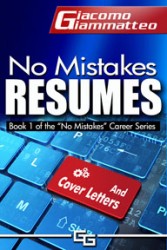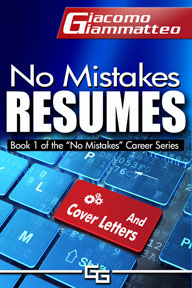I’ve mentioned time and again about making no mistakes on your résumé, but there are certain grammar rules you should break when writing a résumé. Résumés have their own set of rules, and they should be adhered to if you want your résumé read.

Rule Number One
Don’t Include the Articles “The”, “A”, or “An” When Describing Things.
- When writing—for example, in a cover letter or simple prose—you’d say: “I designed an enhancement for the new product, which reduced the weight and size by 9 percent.
When writing that same sentence as a résumé accomplishment, you would eliminate the articles:
- Designed enhancement for new product, which reduced weight and size by 9 percent.
Using this method, you eliminated three articles, Notice also, that you eliminated the pronoun “I” that you had used to start the sentence. So instead of saying “I” did something, you just started right in with what you did, and that brings us to the second of the grammar rules you should break when writing a résumé.
Do Not Begin Sentences with Pronouns
Start right out with the action. Résumés are all about action, and since space is at a premium, eliminate when you can. Above we saw one example already. Instead of saying
- I designed an enhancement for the new product, which reduced the weight and size by 9 percent.
Instead, we eliminated the pronoun and made it:
- Designed enhancement for new product, which reduced weight and size by 9 percent.
At first, it may sound a bit Spartan and clipped, but realize that we already know the résumé is about you, so there is no need to repeatedly use the pronoun I. The I is taken for granted. Who else would you be speaking about?
That same sentence also includes the third of the third of the grammar rules you should break when writing a résumé.
Do Not Spell Out Your Numbers—Even When They are Under 10
This rule is simple. Don’t spell out the numbers—regardless of what the Chicago Manual of Style says. So as you see in the example sentence, we used “9 percent” not “nine percent.” Usually, you spell out numbers below ten, but not on résumés.

Start Sentences—Especially Accomplishments—With Verbs
We’ve already shown this with an example, but we didn’t list this rule as the reason. In our example sentence, we said to eliminate the pronoun I because it wasn’t needed. But we didn’t mention to begin the sentence with a verb. We could have switched the sentence around to say “Product was designed…” Instead, we began the sentence with a verb designed, and that’s the way it should be.
- Designed enhancement for new product, which reduced weight and size by 9 percent.
Verbs denote action, and action is what we want on résumés.
The Bottom Line
For the most part, follow standard grammar rules when writing, but when writing your résumé, it’s not only okay to break a few—it’s recommended.
If you enjoyed this post, please share.
Giacomo Giammatteo is the author of gritty crime dramas about murder, mystery, and family. And he also writes nonfiction books including the No Mistakes Careers series as well as books about grammar, publishing., and children’s fiction and nonfiction.
When Giacomo isn’t writing, he’s helping his wife take care of the animals on their sanctuary. At last count, they had forty animals—seven dogs, one horse, six cats, and twenty-five pigs.
Oh, and one crazy—and very large—wild boar, who used to take walks with Giacomo every day.
He lives in Texas where he and his wife have an animal sanctuary with forty-five loving “friends.”






















Connect
Connect with us on the following social media platforms.